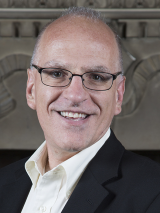Meeting Program — October 2015

Matt Neurock
Shell Professor of Chemical Engineering and Materials Science
University of Minnesota
Abstract — Future strategies for energy production will undoubtedly require processes and materials that can efficiently convert sustainable resources such as biomass into fuels and chemicals. While nature’s enzymes elegantly integrate highly active centers together with adaptive nanoscale environments to control the catalytic transformation of molecules to specific products, they are difficult to incorporate into large scale industrial processes and limited in terms of their stability. The design of more robust heterogeneous catalytic materials that can mimic enzyme behavior, however, has been hindered by our limited understanding of how such molecular transformations proceed over inorganic materials. The tremendous advances in ab initio theoretical methods, molecular simulations and high performance computing that have occurred over the past two decades provide unprecedented ability to track these transformations and how they proceed at specific sites and within particular environments. This information together with the unique abilities to follow such transformations spectroscopically is enabling the design of unique atomic surface ensembles and nanoscale reaction environment that can efficiently catalyze specific molecular transformations. This talk discusses recent advances in computational catalysis and their application to engineering molecular transformations for the conversion of biomass into chemicals and fuels. We will discuss the active sites, mechanisms and nanoscale reaction environments involved in specific bond making and breaking reactions important in the conversion of biomass-derived intermediates into chemicals and fuels and the design of 3D environments necessary to carry out such transformations.
Biography — Matt Neurock is the Shell Professor of Chemical Engineering and Materials Science at the University of Minnesota. He received his B.S. degree in Chemical Engineering from Michigan State University and his Ph.D. from the University of Delaware in 1992. He worked as a Postdoctoral Fellow at the Eindhoven University of Technology in the Netherlands from 1992–1993 and subsequently as Visiting Scientist in the Corporate Catalysis Center at DuPont from 1993–1994. He joined the faculty in Chemical Engineering at the University of Virginia in 1995 where he held joint appointments in Chemical Engineering and Chemistry. In 2014 he moved to the University of Minnesota and is currently on the faculty in Chemical Engineering and Materials Science. He has made seminal advances to development and application of computational methods toward understanding catalytic and electrocatalytic reaction mechanisms, and the sites and environments that carry out reactions under working conditions. He has received various awards for his research in computational catalysis and molecular reaction engineering including the Robert Burwell Lectureship from the North American Catalysis Society, R.H. Wilhelm Award in Chemical Reaction Engineering from the American Institute of Chemical Engineers, Paul H. Emmett Award in Fundamental Catalysis from the North American Catalysis Society, Distinguished Visiting Professor of University of Montpellier, Eastman Chemical Lecturer at the University of California Berkeley, Richard S. H. Mah Lecturer at Northwestern University, Johansen-Crosby Lecturer at Michigan State University, NSF Career Development Award, DuPont Young Investigator Award, Ford Young Faculty Award. He has co-authored over 240 papers, two patents and two books. He is an editor for the Journal of Catalysis and serves on numerous other editorial and advisory boards.